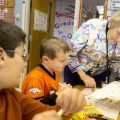PTE考生目前最大的问题之一就是练习题缺乏。除了有限的基本官方书(PLUS,Testbuilder, OG)之外,就没有题了。很多英语基础不是很扎实的同学很难找到练习材料。墨尔本文波雅思PTE培训学校专门为墨尔本,悉尼PTE考生准备了适合PTE听力阅读练习的科学60秒。各位PTE同学可以练习PTE听力中的summarise spoken text和PTE口语中的retell lecture,PTE听力口语-科学60秒-Frosty Moss练习记笔记技巧和复述。废话少说,下面开始:
I Got Rhythm, I Got Reading
听力内容:
60秒科学节目(SSS)是科学美国人网站的一套广播栏目,英文名称:Scientific American – 60 Second Science,节目内容以科学报道为主,节目仅一分钟的时间,主要对当今的科学技术新发展作以简明、通俗的介绍,对于科学的发展如何影响人们的生活环境、健康状况及科学技术,提供了大量简明易懂的阐释。
[SOUND OF DRUMS]
That’s a preschool child beating a drum, in sync with an adult drummer. And here’s a preschooler who can’t find the rhythm.
[SOUND]
Researchers
(at www.brainvolts.northwestern.edu) find that the first child, who can match the drum beat, is more likely to have better early language skills and reading potential. The study is in the Proceedings of the National Academy of Sciences. [Kali Woodruff Carr et al, Beat synchronization predicts neural speech encoding and reading readiness in preschoolers]
Rhythm is a key factor in communication. Speech rhythm provides important cues for meaning. Babies pick up rhythms, and we all use it to help identify syllables and words. An inability to properly process speech and sound°™and rhythm°™appears to be associated with reading problems.
In the study, scientists tested 35 children between three and four years old. An adult drummer beat a tempo meant to mimic the speed of speech. Twenty-two children could beat along; 13 could not.The children who kept the beat were faster at naming objects and colors, had superior short-term auditory memory, and were better at rhythm and melody discrimination. These skills all are related to language and reading.
The researchers suggest that such a drumming test could identify children with early language and literacy challenges. And training could help the kids overcome those challenges°™in part by learning to keep a beat.
–Cynthia Graber





